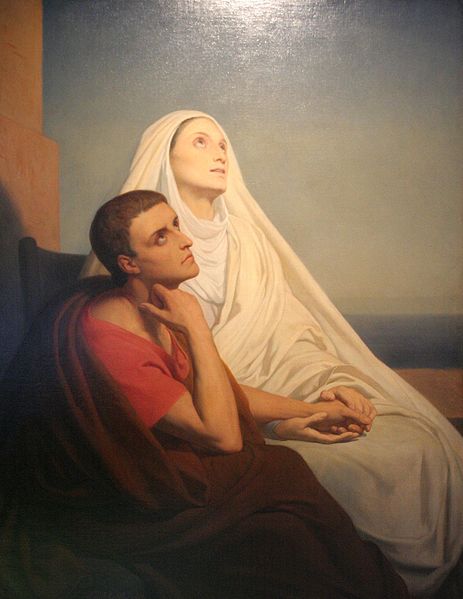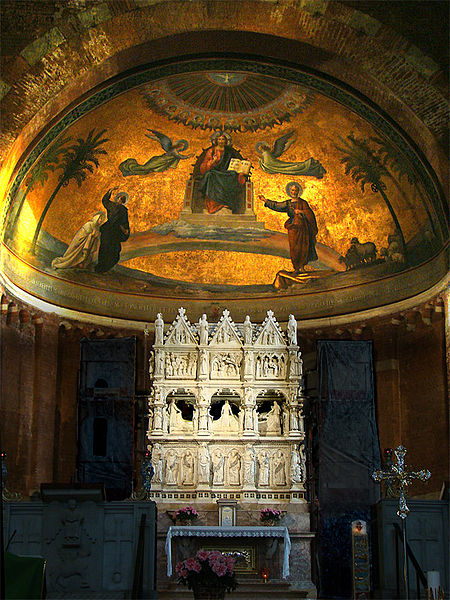<Back to Index>
- Philosopher Augustine of Hippo, 354
- Dramatist Charles Simon Favart, 1710
- Landgrave of Hesse Philip I, 1504
PAGE SPONSOR
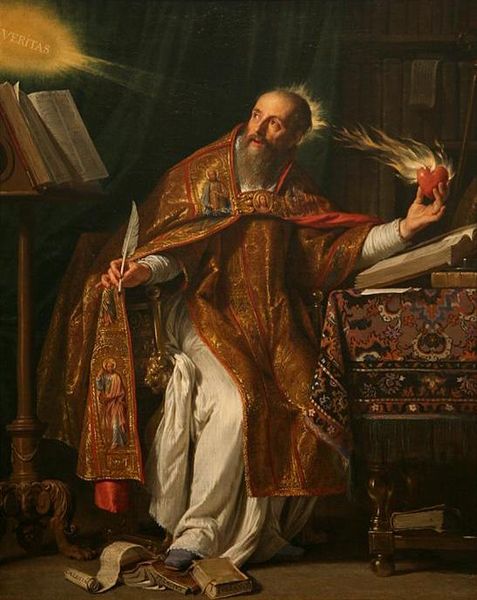
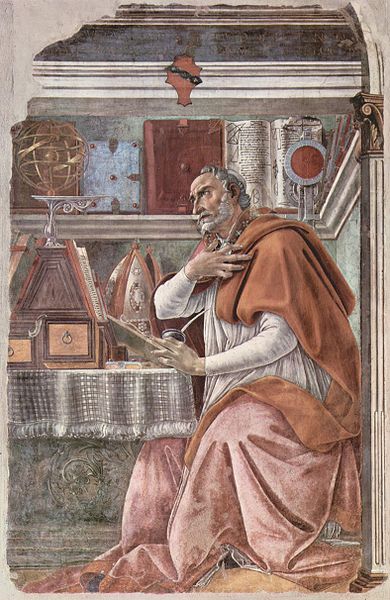
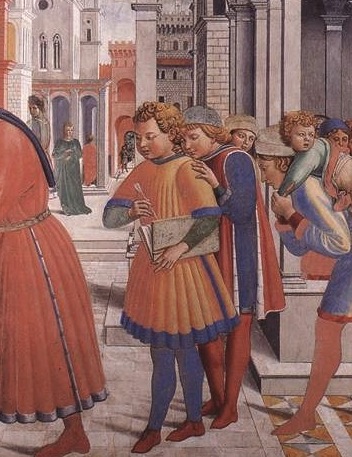
Augustine of Hippo (Latin: Aurelius Augustinus Hipponensis) (November 13, 354 – August 28, 430), also known as Augustine, St. Augustine, St. Austin, St. Augoustinos, Blessed Augustine, or St. Augustine the Blessed, was Bishop of Hippo Regius (present day Annaba, Algeria). He was a Latin speaking philosopher and theologian who lived in the Roman Africa Province. His writings were very influential in the development of Western Christianity.
According to his contemporary, Jerome, Augustine "established anew the ancient Faith". In his early years he was heavily influenced by Manichaeism and afterward by the Neo - Platonism of Plotinus. After his conversion to Christianity and baptism (387), Augustine developed his own approach to philosophy and theology, accommodating a variety of methods and different perspectives. He believed that the grace of Christ was indispensable to human freedom, and he framed the concepts of original sin and just war.
When the Western Roman Empire was starting to disintegrate, Augustine developed the concept of the Church as a spiritual City of God (in a book of the same name), distinct from the material Earthly City. His thought profoundly influenced the medieval worldview. Augustine's City of God was closely identified with the church, the community that worshipped God.
In the Catholic Church and the Anglican Communion, he is a saint and pre-eminent Doctor of the Church, and the patron of the Augustinian religious order; his memorial is celebrated 28 August, the day of his death. He is the patron saint of brewers, printers, theologians, sore eyes, and a number of cities and dioceses. Many Protestants, especially Calvinists, consider him to be one of the theological fathers of Reformation due to his teaching on salvation and divine grace. In the Eastern Orthodox Church he is blessed, and his feast day is celebrated on 15 June. Among the Orthodox, he is called "Blessed Augustine", or "St. Augustine the Blessed".
Augustine was born in 354 to a pagan father named Patricius and a Christian mother named
Monica in the municipium of Thagaste (now Souk Ahras, Algeria) in Roman Africa. Regarding
his ethnic origins, there is a consensus among scholars that his
origins represented an intermingling of the main North African peoples,
that is Berbers, Latins and Phoenicians. Augustine's family name, Aurelius, suggests that his father's ancestors were freedmen of the gens Aurelia given full Roman citizenship by the Edict of Caracalla in 212. Augustine's family had been Roman, from a legal standpoint, for at least a century when he was born. It is assumed that his mother, Monica, was of Berber origin, on the basis of her name, but as his family were honestiores, Augustine's first language is likely to have been Latin. At the age of 11, Augustine was sent to school at Madaurus (now M'Daourouch), a small Numidian city about 19 miles south of Thagaste. There he became familiar with Latin literature, as well as pagan beliefs and practices. While at home in 369 and 370, he read Cicero's dialogue Hortensius (now lost), which he described as leaving a lasting impression on him and sparking his interest in philosophy.
During the years 373 and 374, Augustine taught grammar at Thagaste. The following year he moved to Carthage to conduct a school of rhetoric, and would remain there for the next nine years. Disturbed by the unruly behavior of the students in Carthage, in 383 he moved to establish a school in Rome, where he believed the best and brightest rhetoricians practiced. However, Augustine was disappointed with the Roman schools, where he was met with apathy. Once the time came for his students to pay their fees they simply fled. Manichaean friends introduced him to the prefect of the City of Rome, Symmachus, who had been asked to provide a professor of rhetoric for the imperial court at Milan.
Augustine won the job and headed north to take up his position in late 384. At the age of thirty, he had won the most visible academic position in the Latin world – at a time when such posts gave ready access to political careers. During this period, although Augustine showed some fervor for Manichaeism, he was never an initiate or "elect" but remained an "auditor", the lowest level in the sect's hierarchy.
While he was in Milan, Augustine's life changed. While still at Carthage, he had begun to move away from Manichaeism, in part because of a disappointing meeting with the Manichean Bishop, Faustus of Mileve, a key exponent of Manichaean theology. In Rome, he is reported to have completely turned away from Manichaeanism, and instead embraced the skepticism of the New Academy movement. At Milan, his mother pressured him to become a Christian. Augustine's own studies in Neoplatonism were also leading him in this direction, and his friend Simplicianus urged him that way as well. But it was the bishop of Milan, Ambrose, who had most influence over Augustine. Ambrose was a master of rhetoric like Augustine himself, but older and more experienced.
Augustine's mother had followed him to Milan and he allowed her to arrange a society marriage, for which he abandoned his concubine. It is believed that Augustine truly loved the woman he had lived with for so long. In his "Confessions," he expressed how deeply he was hurt by ending this relationship, and also admitted that the experience eventually produced a decreased sensitivity to pain over time. However, he had to wait two years until his fiancee came of age, so despite the grief he felt over leaving "The One", as he called her, he soon took another concubine. Augustine eventually broke off his engagement to his eleven year old fiancee, but never renewed his relationship with "The One" and soon left his second concubine. It was during this period that he uttered his famous prayer, "Grant me chastity and continence, but not yet" (da mihi castitatem et continentiam, sed noli modo).
In the summer of 386, after having read an account of the life of Saint Anthony of the Desert, which greatly inspired him, Augustine underwent a profound personal crisis, leading him to convert to Christianity, abandon his career in rhetoric, quit his teaching position in Milan, give up any ideas of marriage, and devote himself entirely to serving God and to the practices of priesthood, which included celibacy. According to Augustine his conversion was prompted by a childlike voice he heard telling him in a sing song voice, "tolle, lege" ("take up and read"):
I cast myself down I know not how, under a certain fig tree, giving full vent to my tears; and the floods of mine eyes gushed out an acceptable sacrifice to Thee. And, not indeed in these words, yet to this purpose, spake I much unto Thee: and Thou, O Lord, how long? how long, Lord, wilt Thou be angry for ever? Remember not our former iniquities, for I felt that I was held by them. I sent up these sorrowful words: How long, how long, "to-morrow, and tomorrow?" Why not now? why not is there this hour an end to my uncleanness? So was I speaking and weeping in the most bitter contrition of my heart, when, lo! I heard from a neighbouring house a voice, as of boy or girl, I know not, chanting, and oft repeating, "Take up and read; Take up and read. " Instantly, my countenance altered, I began to think most intently whether children were wont in any kind of play to sing such words: nor could I remember ever to have heard the like. So checking the torrent of my tears, I arose; interpreting it to be no other than a command from God to open the book, and read the first chapter I should find. For I had heard of Antony, that coming in during the reading of the Gospel, he received the admonition, as if what was being read was spoken to him: Go, sell all that thou hast, and give to the poor, and thou shalt have treasure in heaven, and come and follow me: and by such oracle he was forthwith converted unto Thee. Eagerly then I returned to the place where Alypius was sitting; for there had I laid the volume of the Apostle when I arose thence. I seized, opened, and in silence read that section on which my eyes first fell: Not in rioting and drunkenness, not in chambering and wantonness, not in strife and envying; but put ye on the Lord Jesus Christ, and make not provision for the flesh, in concupiscence. No further would I read; nor needed I: for instantly at the end of this sentence, by a light as it were of serenity infused into my heart, all the darkness of doubt vanished away.
— The Confessions of Saint Augustine, Book VIII, Paragraphs 28 and 29.
The volume Augustine read was Paul's Epistle to the Romans (Romans 13: 13-14). He wrote an account of his conversion in his Confessions, which became a classic of Christian theology. Ambrose baptized Augustine, along with his son, Adeodatus, on Easter Vigil in 387 in Milan, and a year later they returned to Africa. Also in 388 he completed his apology On the Holiness of the Catholic Church. On the way back to Africa Augustine's mother died, and Adeodatus soon after. Upon
his return to north Africa Augustine sold his patrimony and gave the
money to the poor. The only thing he kept was the family house, which
he converted into a monastic foundation for himself and a group of friends. In 391 he was ordained a priest in Hippo Regius (now Annaba, in Algeria). He became a famous preacher (more
than 350 preserved sermons are believed to be authentic), and was noted
for combating the Manichaean religion, to which he had formerly adhered. In 395 he was made coadjutor Bishop of Hippo, and became full Bishop shortly thereafter. He
remained in this position until his death in 430. Augustine worked
tirelessly in trying to convince the people of Hippo to convert to
Christianity. He left his monastery, but continued to lead a monastic
life in the episcopal residence. He left a regula his monastery that has led him to be designated the "patron saint of regular clergy". Much of Augustine's later life was recorded by his friend Possidius, bishop of Calama (present day Guelma, Algeria), in his Sancti Augustini Vita.
Possidius admired Augustine as a man of powerful intellect and a
stirring orator who took every opportunity to defend Christianity
against its detractors. Possidius also described Augustine's personal
traits in detail, drawing a portrait of a man who ate sparingly, worked
tirelessly, despised gossip, shunned the temptations of the flesh, and
exercised prudence in the financial stewardship of his see.
Shortly before Augustine's death, Roman Africa was invaded by the
Vandals, a Germanic tribe that that had converted to Arianism.
The Vandals besieged Hippo in the spring of 430, when Augustine entered
his final illness. According to Possidius one of the few miracles
attributed to Augustine took place during the siege. While Augustine
was confined to his sick bed, a man petitioned him that he might lay
his hands upon a relative who was ill. Augustine replied that if he had
any power to cure the sick, he would surely have applied it on himself
first. The visitor declared that he was told in a dream to go to
Augustine so that his relative would be made whole. When Augustine
heard this, he no longer hesitated, but laid his hands upon the sick
man, who departed from Augustine's presence healed. Possidius
also gives a first hand account of Augustine's death, which occurred on
August 28, 430, while Hippo was still besieged. Augustine spent his
final days in prayer and repentance, requesting that the penitential Psalms of David be
hung on his walls so that he could read them. He directed that the
library of the church in Hippo and all the books therein should be
carefully preserved. Shortly
after his death the Vandals lifted the siege of Hippo, but they
returned not long thereafter and burned the city. They destroyed all of
it but Augustine's cathedral and library, which they left untouched. According to Bede's True Martyrology, Augustine's body was later removed to Cagliari, Sardinia, by the Catholic bishops expelled from North Africa by Huneric. Around 720 his remains were moved again by Peter, bishop of Pavia and uncle of the Lombard king Liutprand, to the church of San Pietro in Ciel d'Oro, in order to save them from frequent coastal raids by Moors and Berbers. In January 1327 Pope John XXII issued the papal bull Veneranda Santorum Patrum, in which he appointed the Augustinians guardians
of the tomb of Augustine, which was remade in 1362 and elaborately
carved with bas - treliefs of scenes from Augustine's life. By that
time,
however, the actual remains of Augustine could not be authenticated.
Stonemasons working in the crypt altar removed paving blocks and
discovered a marble box. Within it were other boxes; in the third box
were fragments of wood, numerous bones and bone fragments, and glass
vials. Some of the workers later claimed to have seen the name
"Augustine" written in charcoal on the top of the box. A factor
complicating the authentication of the remains was that San Pietro was
shared by two Augustinian religious orders in bitter rivalry. The Augustinians were expelled from Pavia in 1700, taking refuge in Milan with
the relics of Augustine, and the disassembled Arca, which were removed
to the cathedral there. San Pietro fell into disrepair and was a
military magazine during the Napoleonic occupation of the city. It was finally rebuilt in the 1870s, under the urging of Agostino Gaetano Riboldi, and reconsecrated in 1896 when the relics of Augustine and the shrine were once again reinstalled.
Augustine
was one of the most prolific Latin authors in terms of surviving works,
and the list of his works consists of more than a hundred separate
titles. They include apologetic works against the heresies of the Arians, Donatists, Manichaeans and Pelagians, texts on Christian doctrine, notably De Doctrina Christiana (On Christian Doctrine), exegetical works such as commentaries on Book of Genesis, the Psalms and Paul's Letter to the Romans, many sermons and letters, and the Retractationes (Retractions),
a review of his earlier works which he wrote near the end of his life.
Apart from those, Augustine is probably best known for his Confessiones (Confessions), which is a personal account of his earlier life, and for De civitate dei (Of the City of God,
consisting of 22 books), which he wrote to restore the confidence of
his fellow Christians, which was badly shaken by the sack of Rome by the Visigoths in 410. His De trinitate (On the Trinity), in which he developed what has become known as the 'psychological analogy' of the Trinity, is also among his masterpieces, and arguably one of the greatest theological works of all time. He also wrote On Free Choice Of The Will (De libero arbitrio), addressing why God gives humans free will that can be used for evil. Augustine
was a bishop, priest, and father who remains a central figure, both
within Christianity and in the history of Western thought, and is
considered by modern historian Thomas Cahill to be the first medieval man and the last classical man. In both his philosophical and theological reasoning, he was greatly influenced by Stoicism, Platonism and Neo - platonism, particularly by the work of Plotinus, author of the Enneads, probably through the mediation of Porphyry and Victorinus (as Pierre Hadot has argued). Although he later abandoned Neoplatonism some ideas are still visible in his early writings. His
generally favourable view of Neoplatonic thought contributed to the
"baptism" of Greek thought and its entrance into the Christian and
subsequently the European intellectual tradition. His early and influential writing on the human will, a central topic in ethics, would become a focus for later philosophers such as Schopenhauer and Nietzsche. In addition, Augustine was influenced by the works of Virgil (known for his teaching on language), Cicero (known for his teaching on argument), and Aristotle (particularly his Rhetoric and Poetics). Augustine's concept of original sin was expounded in his works against the Pelagians. However, St. Thomas Aquinas took
much of Augustine's theology while creating his own unique synthesis of
Greek and Christian thought after the widespread rediscovery of the
work of Aristotle. Augustine's doctrine of efficacious grace found eloquent expression in the works of Bernard of Clairvaux; also Reformation theologians such as Martin Luther and John Calvin would look back to him as their inspiration. Augustine was canonized by popular acclaim, and later recognized as a Doctor of the Church in 1298 by Pope Boniface VIII. His feast day is
August 28, the day on which he died. He is considered the patron saint
of brewers, printers, theologians, sore eyes, and a number of cities
and dioceses. The latter part of Augustine's Confessions consists of an extended meditation on the nature of time. Even the agnostic philosopher Bertrand Russell was
impressed by this. He wrote, "a very admirable relativistic theory of
time. ... It contains a better and clearer statement than Kant's of the subjective theory of time - a theory which, since Kant, has been widely accepted among philosophers." Catholic theologians generally subscribe to Augustine's belief that God exists outside of time in
the "eternal present"; that time only exists within the created
universe because only in space is time discernible through motion and
change. His meditations on the nature of time are closely linked to his
consideration of the human ability of memory. Frances Yates in her 1966 study The Art of Memory argues that a brief passage of the Confessions, 10.8.12, in which Augustine writes of walking up a flight of stairs and entering the vast fields of memory clearly indicates that the ancient Romans were aware of how to use explicit spatial and architectural metaphors as a mnemonic technique for organizing large amounts of information. Augustine's philosophical method, especially demonstrated in his Confessions,
has had continuing influence on Continental philosophy throughout the
20th century. His descriptive approach to intentionality, memory, and
language as these phenomena are experienced within consciousness and
time anticipated and inspired the insights of modern phenomenology and hermeneutics. Edmund Husserl writes:
"The analysis of time - consciousness is an age old crux of descriptive
psychology and theory of knowledge. The first thinker to be deeply
sensitive to the immense difficulties to be found here was Augustine,
who laboured almost to despair over this problem." Martin Heidegger refers to Augustine's descriptive philosophy at several junctures in his influential work, Being and Time. Hannah Arendt began her philosophical writing with a dissertation on Augustine's concept of love, Der Liebesbegriff bei Augustin (1929): "The young Arendt attempted to show that the philosophical basis for vita socialis in Augustine can be understood as residing in neighbourly love, grounded in his understanding of the common origin of humanity." Jean Bethke Elshtain in Augustine and the Limits of Politics finds
likeness between Augustine and Arendt in their concepts of evil:
"Augustine did not see evil as glamorously demonic but rather as
absence of good, something which paradoxically is really nothing.
Arendt ... envisioned even the extreme evil which produced the
Holocaust as merely banal [in Eichmann in Jerusalem]." Augustine's
philosophical legacy continues to influence contemporary critical
theory through the contributions and inheritors of these 20th century
figures. According to Leo Ruickbie, Augustine's arguments against magic,
differentiating it from miracle, were crucial in the early Church's
fight against paganism and became a central thesis in the later
denunciation of witches and witchcraft. According to Professor Deepak
Lal, Augustine's vision of the heavenly city has influenced the secular
projects and traditions of the Enlightenment, Marxism, Freudianism and Eco - fundamentalism. On
the topic of original sin, Aquinas proposed a more optimistic view of
man than that of Augustine in that his conception leaves to the reason,
will, and passions of fallen man their natural powers even after the
Fall.
While
in his pre - Pelagian writings Augustine taught that Adam's guilt as
transmitted to his descendants much enfeebles, though does not destroy,
the freedom of their will, Protestant reformers Martin Luther and
John Calvin affirmed that Original Sin completely destroyed liberty (total depravity).
